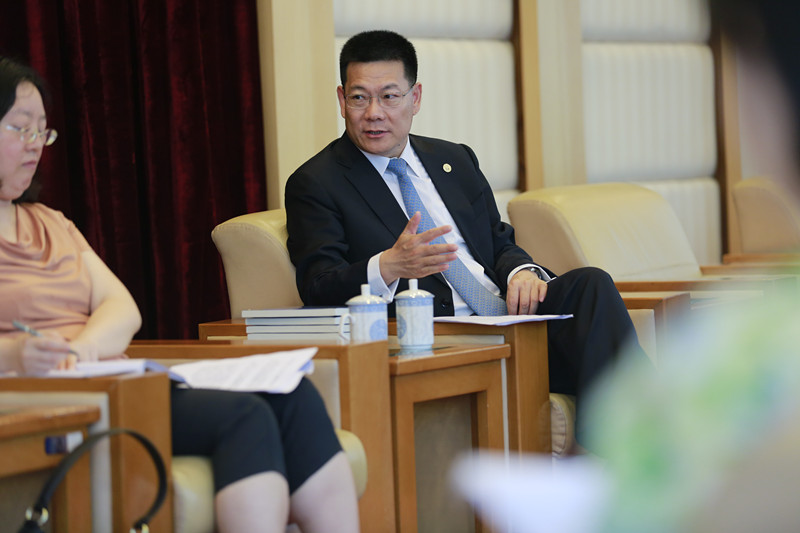In 2013, XI Jinping, the President of China, proposed a bilateral and multilateral development cooperation strategy named the Belt and Road Initiative, while many of the languages of the countries included in the strategy are established as different language majors in GDUFS. On the morning of 7th May, 2015, ZHONG Weihe, the President of GDUFS, was interviewed by media including the Guangdong News and China Daily on the theme of how GDUFS’s language majors will serve the Belt and Road Initiative at the Welcome Chamber of the Executive Office Building.

ZHONG Weihe in Interview
GDUFS to establish more foreign language majors
“There is no doubt that languages are the foundation of the Belt and Road Initiative as well as the superiority of GDUFS.” President ZHONG said. During the interview, he indicated that GDUFS decided to serve the Belt and Road Initiative by establishing more foreign language majors. There were only 4 foreign language majors in GDUFS in 1965, 9 in 1970 and presently 19 … not counting English. The number of foreign language majors keeps increasing, meeting the needs for China’s international cooperations. In 2015, GDUFS established the major of Malaysian and the major of Urdu. President ZHONG expressed the hope that some languages of Eastern Europe and west Asia like Greek, Farsi and Turkish could be covered in the next 3 to 5 years. In addition, he said GDUFS is attempting to increase foreign language majors to 30 in 5 years.
GDUFS stands out from other foreign language-studies universities
GDUFS is an excellent university, with 2 secondary disciplines ranking first among domestic universities of foreign language studies and the overall level of the first-rank disciplines was granted the top three. What’s more, GDUFS has made efforts to promote the international communication of information and science. The Collaborative Innovation Center of the 21st Century Maritime Silk Road was established in GDUFS to serve the Belt and Road Initiative. GDUFS is determined to cultivate a new Chinese-style think tank, which is hoped to be an innovative organization of scholarly research, a high-level think tank, an elite training base as well as an international communication center.
In addition, GDUFS pays attentions to the cultivation of outstanding students and the majors. Since the establishment of the Center for Canadian Studies, it has reaped the harvest of its research and teaching activities on several majors, which promotes the understanding and cultural interchange of China and Canada. GDUFS intends to establish other centers of foreign countries studies in the future. Besides, GDUFS is one of the eight professional foreign languages workers training bases, providing China with many professional language workers.
The Bright Future of Foreign Language Majors
Some foreign language majors of GDUFS maintain recruiting levels of about 20 students each year. Except for the English major, other foreign language majors adopt the teaching strategy of compounding English and their major in language learning. Additioinally, in order to broaden students’ international horizons and improve their language abilities as well as the practical abilities, GDUFS will send students to foreign countries for studies for half a year or a year.
ZHONG mentioned that the career prospect of GDUFS’s foreign language majors is quite bright. The revolution of the credit system will provide students of foreign language majors, except for English majors, with more opportunities to choose different courses, which will promote the employment of the students.
The Teacher Shortage Needs Aids from the Government
However, with the increase of foreign languages being taught, the teacher shortage turns into an obstacle. GDUFS would employ one to two foreign teachers for each foreign language major. Other teachers should be given a PHD degree or above. But as a consequence of the teacher shortage, there is no alternative but to employ teachers with bachelor or master’s degrees. Besides, there is an urgent need to promote the construction of a young and middle-aged teachers group. No matter how the accepted numbers of students vary, the academic standards and the teachers of these majors must maintain a high level, which signifies a huge cost. Therefore, it is necessary to get financial aid from the government.
ZHONG mentioned that, compared to other countries, the number of foreign languages studied, except for English, is not sufficient in China. There are less than 70 foreign languages being learned in China while the number is over 150 in universities of other countries. To improve China’s cultural soft power, emphasis is supposed to be put on cultivating more and more students with professional foreign languageskill

